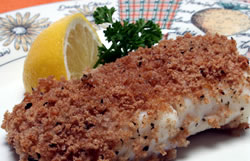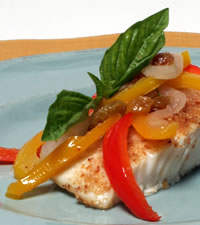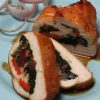Butternut squash is one of the handiest and healthiest vegetables you can serve. It might win the vegetable versatility award, as you can bake or roast it, steam or boil it, use it in stews or a stir-fry. Butternut squash is good in soups, main dishes, as a side dish, and even for dessert, where it can take the place of pumpkin or sweet potato as a pie filling.
The slightly sweet, nutty flavor of butternut squash is enhanced by a wide range of seasonings. In America we tend to stick to cinnamon and nutmeg, but butternut squash also turns up in highly spiced North African stews, chile pepper-spiked Latin dishes and in incendiary Thai curries. It is even delicious seasoned with Mediterranean herbs such as thyme and oregano. The texture of butternut squash is flexible enough to be served in hearty chunks, or finely chopped and mixed into risotto, or whirled into a creamy puree that is delicious presented as a soup or a side dish.
Nutritionally, butternut squash has more vitamin C and beta-carotene than any other winter squash. It is also easier to use than its harder shelled cousins like acorn and spaghetti squash. In fact, you can simply boil or steam the squash, then slip the skin off using a knife run just under the surface. The seeds scoop out just as easily. If you want to cut down on prep time even more, you can buy butternut squash already cut up and ready to cook.
Some foods immediately call to mind an ideal partner, like rice and beans, peanut butter and jelly, or tomatoes and basil. For butternut squash, though, the list of happy pairings is almost endless. In winter, I particularly like combining it with apples, chestnuts, and almost any bean, from green snap beans to dried Tuscan white or canned, velvety pintos.
Unlike other winter squashes, butternut is generally available year-round. Since bigger squashes tend to be sweeter, buy a nice hefty one and use it to make these enchiladas.
Butternut Squash Enchiladas with Salsa Verde
Yield: Makes 8 servings.
Ingredients
- 1 package (16 oz.) diced peeled butternut squash, or 1 1/4 lb. squash, seeded, peeled and diced
- Canola oil spray
- 1 can (15.5 oz.) pinto beans, rinsed and drained
- 3/4 cup (3 oz.) crumbled reduced-fat feta cheese, divided
- 8 large (about 7-inch) corn tortillas
- 1 jar (16 oz.) salsa verde
- Salt and freshly ground black pepper, to taste
- 1/4 cup chopped fresh cilantro leaves, for garnish (optional)
Directions
- Place squash in medium saucepan. Add 1 cup water. Cover pot tightly, and place over medium-high heat. Cook until squash is tender but not mushy, 12-15 minutes, depending on size of cubes. Drain squash, and set aside.
- Meanwhile, preheat oven to 350 degrees. Select a baking dish just large enough to hold the eight tortillas, folded over and slightly overlapping, so that they fit snuggly in the dish. (You may want to �test� and see if the baking dish is the proper size by arranging unfilled, folded tortillas in it, as they would be once filled and ready to bake.) using the canola oil spray, lightly coat the interior of the baking dish and set aside.
- Place beans in mixing bowl. Using fork, partially mash beans. Add squash and blend, leaving mixture coarsely mashed, with some beans still whole. Mix in 1/2 cup of the cheese. Season filling to taste with salt and pepper.
- Coat a tortilla on both sides with cooking spray. Lay it on a plate. Spoon 3/4 cup of filling on one half of the tortilla. Fold tortilla in half over filling. Set it at one end of the baking dish. Repeat, placing filled tortillas so they overlap, filling baking dish tightly. Pour pur�ed sauce over assembled enchiladas. Sprinkle remaining cheese over sauce. Cover pan with foil.
- Bake enchiladas about 30 minutes, until they are heated through and tortillas are soft. Uncover and serve garnished with cilantro, accompanied by cooked brown rice, if desired.
Nutritional Information Per Serving:
180 calories,
2 g. total fat (1 g. saturated fat),
33 g. carbohydrate,
8 g. protein,
7 g. dietary fiber,
479 g. sodium
AICR










